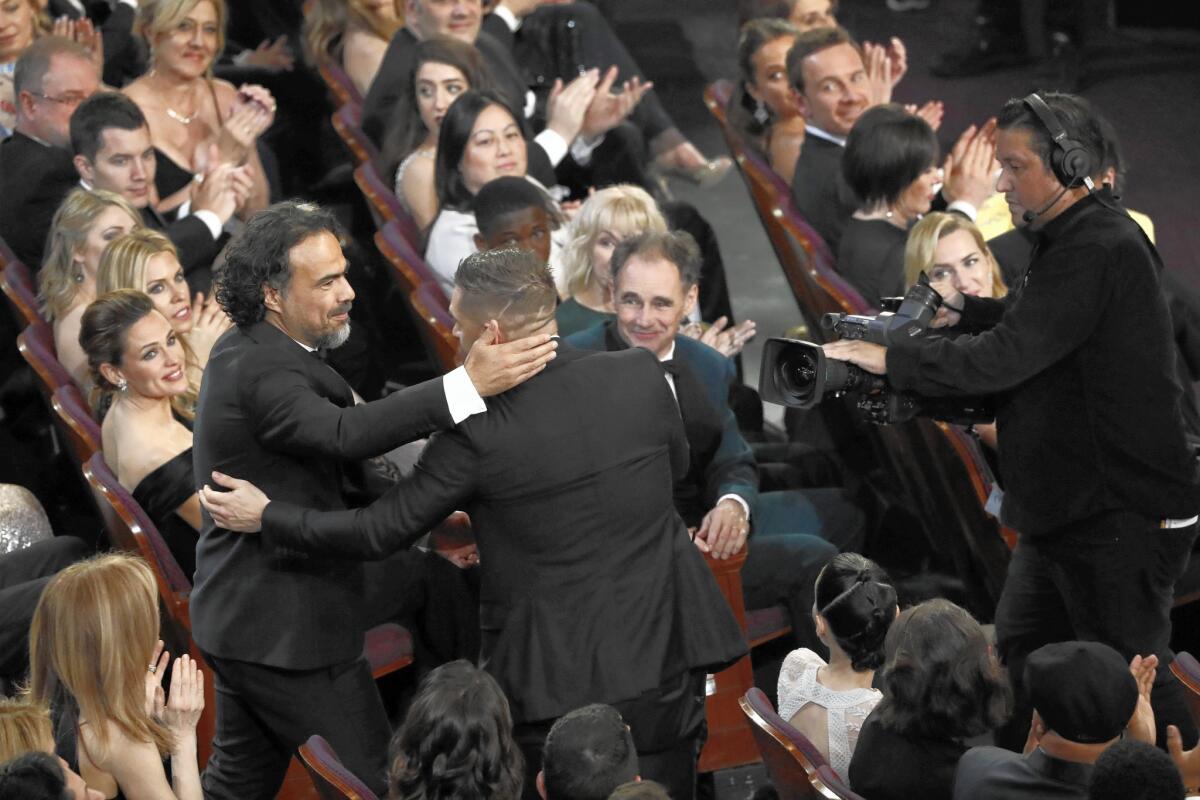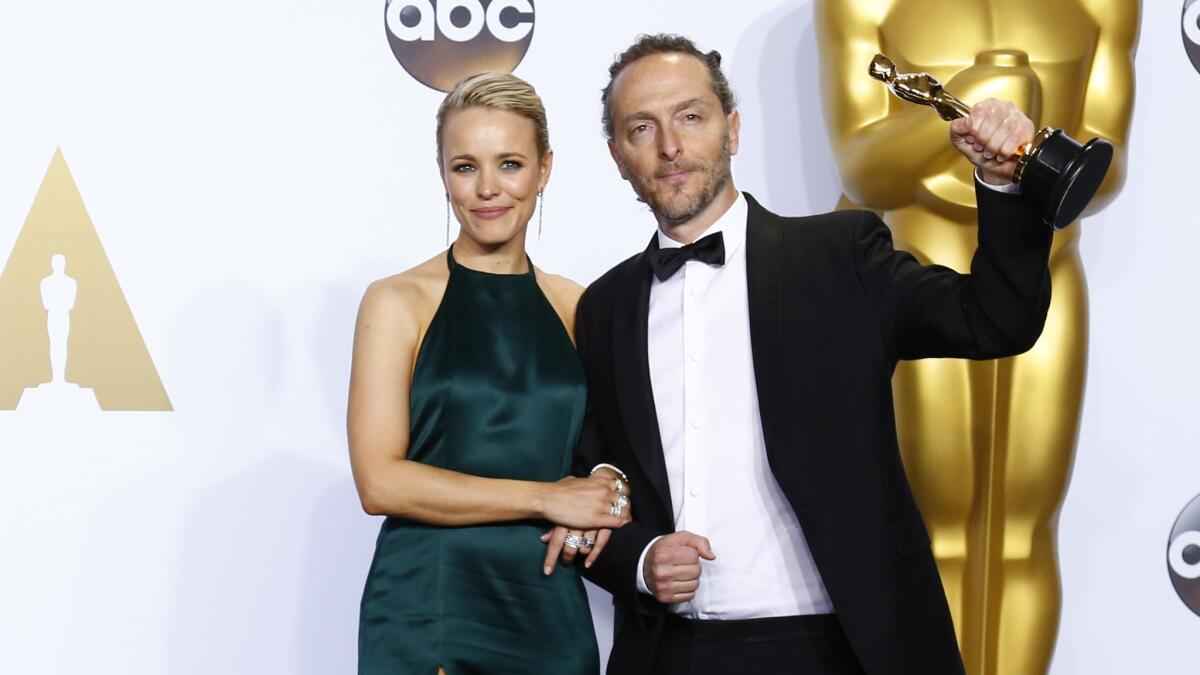‘The Revenant’s’ Mexican director and cinematographer make history with consecutive Oscar wins

- Share via
The historic Oscars won by director Alejandro G. Iñárritu and cinematographer Emmanuel Lubezki for “The Revenant” were a testament to the power and virtuosity of Mexican filmmakers and the allure they have for a Hollywood increasingly looking for evocative international voices.
On a night of speeches about Hollywood’s lack of diversity, Iñárritu and Lubezki were etched into the record books. Iñárritu became the first Mexican director — and just the third director in history — to win back-to-back Oscars. His countryman Lubezki was the first cinematographer to win three consecutive Oscars, a remarkable run epitomized by the ferocious imagery of “The Revenant.”

“The Revenant’s” Emmanuel “Chivo” Lubezki, with Rachel McAdams, displays his third consecutive Oscar for cinematography. He won last year for “Birdman” and the year before for “Gravity.”
OSCARS 2016: List of nominees | Red carpet arrivals | Best and worst dressed
“I can’t believe this is happening,” Iñárritu said as he accepted his award. “I want to thank Chivo [Lubezki]. Thank you for bringing the light to this journey.”
Iñárritu and Lubezki are among a class of gifted Mexican filmmakers that rose to prominence more than a decade ago. With directors Alfonso Cuarón and Guillermo del Toro, Iñárritu and Lubezki have examined our egos, frailties and fears with films that have conjured deep space, the claustrophobic maze of a Broadway theater, the beauty and brutality of the frontier and the haunted recesses of a child’s imagination.
Their movies are compelling, poignant and arresting glimpses of idiosyncratic worlds defined by gnawing inner voices and existential unease. Iñárritu won the directing Oscar in 2015 for “Birdman.” A year earlier, Cuarón received the same honor for “Gravity.” Lubezki won the cinematography award for both films. And Del Toro’s “Pan’s Labyrinth,” a dark fable of fascists and a princess, picked up three Oscars in 2007.
The power of Iñárritu and Cuarón’s recent work is the magician-like way Lubezki slips into the directors’ imaginations to create not so much his own style but startling visuals that at once define and are subsumed by the story. In “Gravity,” the cinematographer summoned the eerie vacuum of space; in “Birdman” he followed a fretful Michael Keaton through a tangle of hallways, and in “The Revenant” he used natural light and the grandeur of the forest to convey a Hobbesian view of survival.
The movies affirmed that the filmmakers, who gained fame beginning with Iñárritu’s “Amores Perros” in 2000, could translate their aesthetic sensibilities to international audiences similar to the French directors of the New Wave in the 1950s and ‘60s and the Italian neo-realists who emerged after World War II. Much of Mexicans’ success comes from a penchant for risk: “He loves to live on the edge,” Iñárritu said of Lubezki. “If failure is not a possibility, he doesn’t seem interested.”
OSCARS 2016: Show highlights | Backstage | Winners room
“Amores Perros” drew wide acclaim and was nominated for an Oscar for foreign-language film. His 2006 “Babel,” starring Brad Pitt in a globe-spanning drama, was nominated for seven Academy Awards. But it was “Birdman,” a loosely based autobiography of a man seeking artistic redemption, that solidified earlier praise.
“Making ‘Birdman’ I learned — and maybe I should have done this before — but I learned that I should risk a little more,” he told The Times during the filming of that movie. “I should explore more things I’m not necessarily comfortable with.”
That philosophy was at play during the difficult conditions in Canada and Argentina during the making of “The Revenant.” The result was a second consecutive Oscar. The only other directors to accomplish that were John Ford for “The Grapes of Wrath” and “How Green Was My Valley” in 1941-42 and Joseph L. Mankiewicz for “A Letter to Three Wives” and “All About Eve” in 1950-51.
Lubezki’s feat of three consecutive Oscars is even more remarkable. It is the mark of a director of photography who has worked with some of the most unique voices in cinema, including Terrence Malick (“The Tree of Life” and “The New World”) and Tim Burton (“Sleepy Hollow”). Lubezki has been nominated for eight Academy Awards: three for films by Cuarón and two each for films by Iñárritu and Malick and one with Burton.
“This is incredible,” Lubezki said upon accepting his latest Oscar. “I want to share it with the cast and crew, especially with my compadre [Iñárritu].” He added: “I never saw the Academy Awards as a competition. ... I’m lucky, [but] it doesn’t mean I’m the best cinematographer.”
jeffrey.fleishman@latimes.com
MORE:
Alicia Vikander’s supporting actress Oscar caps off a whirlwind year
Chris Rock was right, this year the Oscars really were a little different
More to Read
Sign up for The Envelope
Get exclusive awards season news, in-depth interviews and columnist Glenn Whipp’s must-read analysis straight to your inbox.
You may occasionally receive promotional content from the Los Angeles Times.











